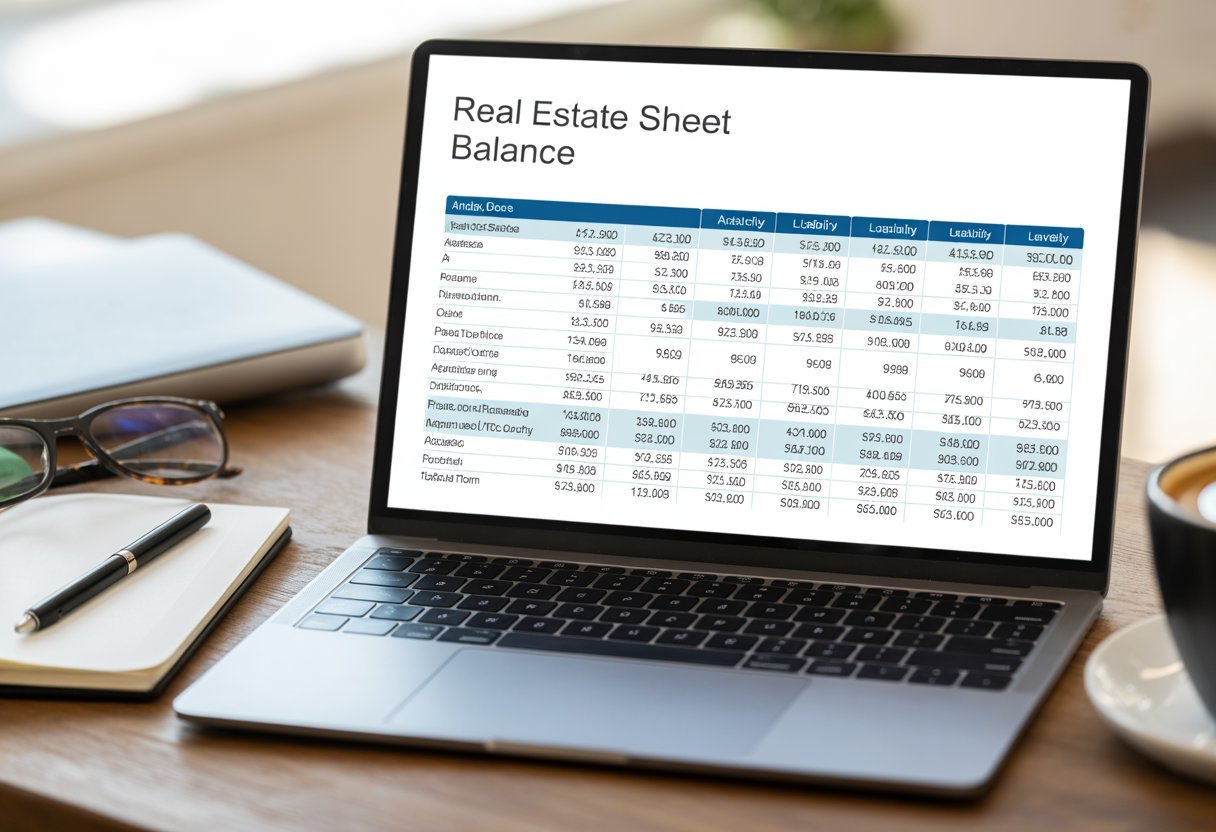Real estate accounting requires meticulous attention to detail and proper record-keeping to track property-related finances effectively. Successful real estate accounting involves separating business and personal funds, maintaining detailed records of income and expenses, and implementing a clear system for tracking property-related transactions.
Real estate accounting fundamentals encompass monitoring tenant leases, managing operating expenses, and maintaining accurate financial records for tax purposes. Your success in real estate investing depends on establishing proper accounting practices from the start.
Creating a structured chart of accounts helps you organize financial information by property, making it easier to analyze performance and make informed investment decisions. This foundation enables you to track rental income, security deposits, maintenance costs, and property improvements efficiently.
Key Takeaways
- Proper accounting systems help maximize property profitability and ensure tax compliance
- Separating business and personal finances creates clear financial visibility
- Digital accounting tools streamline property management and financial reporting
Real Estate Accounting Overview
Real estate accounting requires specialized knowledge to properly track financial transactions, maintain compliance, and make informed investment decisions for property assets.
Key Accounting Principles
Your real estate accounting system must track cash flows from multiple revenue streams, including rent payments, security deposits, and property sales.
Financial record-keeping for properties requires accurate documentation of operating expenses like maintenance, insurance, property taxes, and utilities.
You need to maintain separate ledgers for each property to track individual performance metrics and profitability.
Key accounting methods include:
- Accrual accounting for recording revenues and expenses
- Cost segregation for tax purposes
- Depreciation tracking for buildings and improvements
- Capital expense documentation
Difference Between Commercial and Residential Real Estate Accounting
Commercial properties typically involve more complex lease structures, requiring detailed tracking of common area maintenance (CAM) charges, triple net expenses, and tenant improvements.
Your residential accounting focuses on shorter lease terms, security deposit management, and individual tenant payment tracking.
Commercial properties often need:
- Multi-year lease amortization schedules
- Tenant improvement allowance tracking
- Complex expense allocation methods
Residential properties require:
- Monthly rent roll management
- Utility bill-back systems
- Security deposit trust accounting
Property Valuation and Accounting
Accurate property valuation forms the foundation of real estate accounting and determines important financial decisions like setting rental rates, calculating depreciation, and establishing sale prices. Real estate accounting involves specialized valuation methods that help determine a property’s true market worth.
Appraisal Methods Overview
Property appraisal uses three primary approaches to determine value: market, income, and cost methods. Each method serves different purposes and property types.
You’ll need to consider factors like location, property condition, market trends, and economic indicators when selecting an appraisal method.
Professional appraisers typically use multiple methods to cross-validate their findings and arrive at the most accurate valuation.
Market Approach
The market approach compares your property to similar recently sold properties in the same area, making adjustments for differences in features and condition.
You’ll analyze comparable properties or “comps” based on key metrics:
- Square footage
- Number of units
- Age and condition
- Location quality
- Recent improvements
- Special features
This method works best for residential properties and commercial buildings with many comparable sales in the area.
Income Approach
The income approach calculates property value based on its potential to generate future income through rent or other revenue streams.
You’ll need to:
- Calculate gross potential income
- Subtract vacancy and collection losses
- Deduct operating expenses
- Apply a capitalization rate
This method proves most effective for income-producing properties like:
- Apartment buildings
- Office complexes
- Retail centers
- Industrial facilities
Cost Approach
The cost approach estimates value by calculating the cost to construct an identical property from scratch, minus depreciation.
You must consider:
- Current construction costs per square foot
- Land value
- Physical deterioration
- Functional obsolescence
- External obsolescence
This method works particularly well for:
- New construction
- Special-use properties
- Properties with limited market data
- Insurance valuations
The proper valuation method impacts key accounting decisions like depreciation calculations and asset reporting on financial statements.
Financial Statements in Real Estate
Real estate financial statements form the foundation of property investment analysis and performance tracking. These documents provide critical metrics for making informed business decisions and evaluating property values.
Balance Sheet Components
Your real estate balance sheet lists all assets, liabilities, and equity at a specific point in time. Property holdings, equipment, and cash reserves represent the primary assets.
Current assets include rent receivables, security deposits, and operating accounts. Fixed assets encompass buildings, land, and improvements.
Your liabilities section should detail mortgage balances, property taxes due, and maintenance expenses payable. Long-term debt typically includes mortgages and construction loans.
Owner’s equity reflects your capital contributions plus retained earnings from operations. Track this value to measure your actual ownership stake in the properties.
Income Statement Analysis
Your income statement tracks revenue and expenses over specific periods. Rental income forms the primary revenue stream, while other sources may include parking fees and late payment charges.
Operating expenses encompass:
- Property management fees
- Insurance premiums
- Utilities
- Maintenance costs
- Property taxes
Calculate your Net Operating Income (NOI) by subtracting operating expenses from rental revenue. This figure helps determine property performance and value.
Track your debt service coverage ratio to ensure sufficient income for mortgage payments.
Cash Flow Statement Essentials
The cash flow statement reveals money movement through your operations, investing, and financing activities.
Operating cash flows include:
- Rent collections
- Property management payments
- Insurance premiums
- Utility payments
Investment activities cover property acquisitions, sales, and capital improvements. These transactions significantly impact your cash position.
Financing activities track mortgage payments, equity distributions, and capital raising efforts. Monitor these flows to maintain healthy leverage ratios and cash reserves.
Accounting for Property Transactions
Real estate transactions require understanding accounting terms and precise accounting methods to track financial flows and maintain accurate records of property-related activities. Proper documentation and accounting procedures protect both buyers and sellers while ensuring compliance with tax regulations.
Purchase Considerations
When you acquire a property, record the purchase price and associated costs like title fees, legal expenses, and transfer taxes as part of the total asset value. These costs form your property’s cost basis.
You must capitalize major improvements that extend the property’s life or increase its value. Regular maintenance and repairs are expensed in the current period.
Document your financing arrangements, including mortgage terms, interest rates, and payment schedules. Track both principal and interest payments separately in your accounting system.
Sale Transactions and Capital Gains
Track your selling expenses and commissions to accurately calculate net proceeds from property sales. These costs reduce your taxable gain.
Calculate your capital gain by subtracting your adjusted cost basis from the net sale price. Keep detailed records of improvements made during ownership as they adjust your cost basis.
Report different holding periods correctly – properties held over one year qualify for long-term capital gains rates, while shorter periods face higher short-term rates.
Lease Accounting
Record tenant security deposits as liabilities since you must return them when lease terms end. Keep these funds in separate accounts from operating cash.
Track tenant pro-rata expenses like property taxes, insurance, and common area maintenance. Bill these costs according to lease terms and square footage occupied.
Create separate ledgers for each tenant to monitor rent payments, late fees, and operating expense reconciliations. Set up a clear system for recording prepaid rent and deferred revenue.
Monitor lease renewal dates and rent escalation clauses to ensure timely updates to your accounting records. Document all lease modifications properly.
Operating Costs and Revenue Recognition
Accurate tracking of operating expenses and proper revenue recognition form the cornerstone of successful real estate accounting practices. These elements directly impact profitability calculations and financial reporting accuracy.
Expense Recording and Management
Your property operating costs must be tracked and managed systematically to maintain accurate financial records. This includes utilities, maintenance, insurance, and property management fees.
Create separate expense categories for each property in your accounting system to prevent commingling of funds and enable precise profitability analysis.
You should record expenses using the accrual method, which means recognizing costs when incurred rather than when paid. This provides a more accurate picture of your property’s financial health.
Set up automated systems to track recurring expenses and implement approval workflows for non-routine costs to maintain control over spending.
Recognizing Rental Income
Revenue recognition in real estate follows specific accounting principles that require you to record income when earned, not when payment is received.
For rental properties, you should recognize revenue on a straight-line basis over the lease term, even if rent payments vary month to month.
Record security deposits separately from rental income, as these are not recognized as revenue until earned through lease violations or damages.
The installment method can be useful for managing income from property sales, allowing you to recognize revenue as payments are received rather than all at once.
Taxation in Real Estate
Real estate taxation involves complex rules and specific deductions that directly impact your property investments and financial returns. Tax laws provide both obligations and opportunities for real estate owners and investors.
Property Taxes
Property taxes are assessed annually based on your property’s value and local tax rates. Your municipality determines the tax rate, which typically ranges from 0.5% to 2.5% of the assessed value.
Property tax assessments must be carefully monitored and can be appealed if you believe the valuation is incorrect.
You can often deduct property taxes on your federal income tax return, which helps reduce your overall tax burden.
Many jurisdictions offer property tax exemptions for primary residences, senior citizens, veterans, or disabled individuals.
Depreciation Methods
Real estate depreciation allows you to deduct the cost of income-producing property over time. Residential properties depreciate over 27.5 years, while commercial properties use a 39-year schedule.
You must use the Modified Accelerated Cost Recovery System (MACRS) for properties placed in service after 1986.
Land value cannot be depreciated – only the building and improvements qualify for depreciation deductions.
Component depreciation lets you depreciate specific building elements at different rates, potentially increasing your early-year deductions.
Tax Deductible Real Estate Expenses
Your deductible expenses include mortgage interest, insurance premiums, and maintenance costs for investment properties.
Property management fees, travel expenses for property management, and legal services are fully deductible in the year paid.
Marketing costs, utilities, and repairs qualify as immediate deductions. Capital improvements must be depreciated over time.
Professional services like accounting, tax preparation, and property inspections count as legitimate business expenses.
Keep detailed records of all expenses with receipts and documentation to support your deductions during tax audits.
Real Estate Investment Trusts (REITs) Accounting

REITs accounting principles require strict adherence to specific regulations and standards while maintaining transparency in financial reporting for investors and regulatory compliance.
Fundamentals of REITs Accounting
To qualify as a REIT, you must distribute at least 90% of taxable income to shareholders annually. Income-producing properties form the core of REIT operations, requiring specialized accounting treatment.
Your REIT accounting must follow Generally Accepted Accounting Principles (GAAP) with particular attention to:
- Fair value measurements of real estate assets
- Revenue recognition from rental income
- Treatment of property acquisitions and dispositions
REIT-specific accounting practices include tracking Funds From Operations (FFO), which provides a clearer picture of operating performance by excluding gains or losses from property sales.
REITs Financial Reporting
Your REIT financial statements must include detailed disclosures about property holdings, occupancy rates, and lease terms.
Key reporting requirements include:
- Quarterly and annual SEC filings (Forms 10-Q and 10-K)
- Net Asset Value (NAV) calculations
- Detailed property portfolio performance metrics
You must maintain proper documentation of:
- Property valuations
- Operating expenses
- Distribution requirements
- Tax compliance records
Special attention should be given to reporting non-GAAP measures like FFO, Adjusted FFO (AFFO), and Net Operating Income (NOI).
Real Estate Accounting Software Solutions
Modern real estate accounting software platforms automate critical financial tasks while providing detailed insights for property management and investment decisions.
Essential Features
Your real estate accounting software must include automated bank reconciliation and transaction categorization to reduce manual data entry and errors.
Property management features should handle rent collection, lease tracking, and tenant management in one integrated system.
Key capabilities to look for:
- Double-entry accounting system
- Property-specific chart of accounts
- Automated rent roll tracking
- Commission management
- Custom financial reporting
- Bank feed integration
Integrations with Other Systems
Your accounting platform needs to connect seamlessly with other business tools. Modern solutions integrate with property management, CRM, and document management systems.
Critical integrations include:
- Payment processing platforms
- Property listing services
- Electronic document signing
- Tax preparation software
- Property maintenance apps
These connections eliminate double data entry and create a unified workflow across your entire real estate operation.
Look for software offering API access to enable custom integrations with your existing technology stack.
Frequently Asked Questions
Real estate accounting involves specialized practices, regulations and procedures that differ from standard business accounting. Common questions focus on tracking property-related income, expenses, depreciation and tax implications.
What are the basic principles of real estate accounting?
Real estate accounting basics include tracking rental income, property expenses, mortgage payments, and capital improvements. You must maintain separate ledgers for each property to accurately monitor financial performance.
Your accounting system needs to record both operating and non-operating expenses while distinguishing between repairs and improvements.
Tax regulations require specific treatment of various real estate transactions, including proper classification of expenses as either deductible or capitalized costs.
How do the accounting entries differ between residential and commercial real estate transactions?
Commercial properties typically involve more complex lease arrangements, tenant improvements, and common area maintenance charges that require specialized accounting treatment.
Residential properties focus on monthly rent collection, security deposits, and standard maintenance expenses. You’ll need separate accounts for utilities, repairs, and tenant-related expenses.
The lease terms determine how you recognize revenue and expenses. Commercial triple net leases require different accounting procedures than standard residential leases.
Can you explain typical real estate accounting practices for property management?
Property management accounting requires tracking tenant payments, security deposits, maintenance expenses, and owner distributions. You must maintain separate trust accounts for tenant security deposits.
Property management software integration helps automate rent collection, expense tracking, and financial reporting. Each property should have its own chart of accounts.
Monthly reconciliation ensures accurate reporting of income and expenses to property owners.
How does one record and track depreciation in real estate accounting?
Depreciation calculations must follow IRS guidelines for residential and commercial properties. The standard depreciation period is 27.5 years for residential properties and 39 years for commercial properties.
You’ll need to track both building and improvement depreciation separately. Land value is not depreciable and must be excluded from depreciation calculations.
What are the key differences between cash and accrual accounting in real estate?
Cash accounting records income when received and expenses when paid. This method works well for smaller real estate operations with simple transactions.
Accrual accounting recognizes income when earned and expenses when incurred, regardless of payment timing. This provides a more accurate picture of financial performance and is required for larger real estate operations.
What qualifications are needed for a career in real estate accounting?
A bachelor’s degree in accounting or finance provides essential foundational knowledge. Professional certifications like CPA or real estate specific credentials enhance career prospects.
Strong knowledge of tax regulations, property management software, and real estate terminology is essential. Experience with industry-specific accounting software and automated systems is increasingly important.



